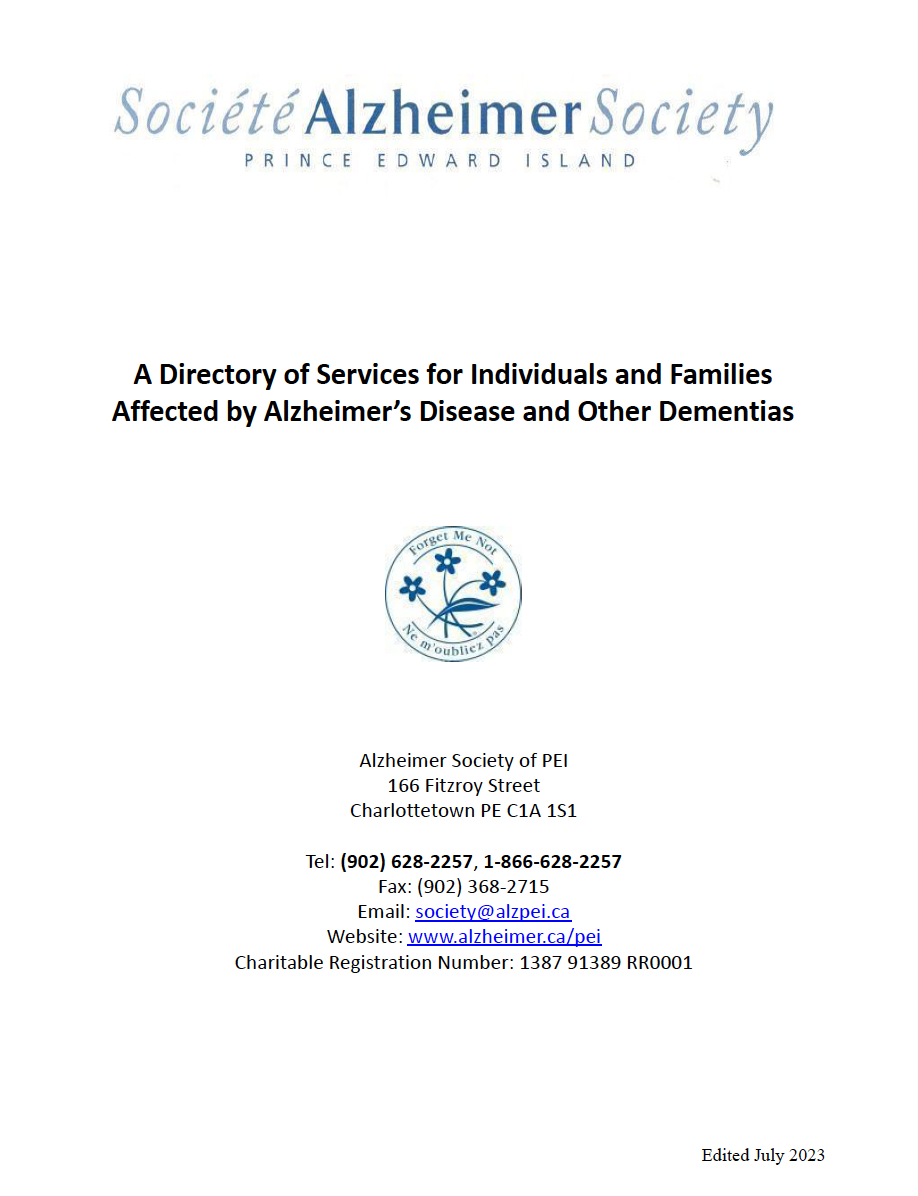Dementia Resources in PEI
The Alzheimer Society of PEI offers resources for people with dementia, caregivers, family members and healthcare providers. Below is a listing of our most up to date resources.

Resource Directory PEI
This resource directory aims to provide information on the available community resources for people living with dementia and their caregivers in Prince Edward Island. Our best effort has been made to ensure that the information contained in this resource directory is accurate and up-to-date at the time of publication.
Clicking on the image to the left or the link above will download the resource directory as a PDF file.

Programs & services
Risk factors and genetics
Diagnosis
- Benefits of an early diagnosis
- Getting a diagnosis
- Preparing for your doctor's visit
- Principles for a dignified diagnosis
From the Alzheimer Society of PEI
Alzheimer's disease
- What is Alzheimer's disease? | Print-friendly version
- Dispelling the myths | Print-friendly version
- 10 warning signs | Print-friendly version | One-page illustrated version
- What to expect | Print-friendly version
- First steps | Print-friendly version
From the Alzheimer Society of PEI
Progression
Other dementias
- Dementia with Lewy bodies
- Down syndrome and Alzheimer's disease
- Frontotemporal dementia
- Mixed Dementia
- Vascular dementia
Rare types of dementia
Living with dementia
- Communication
- Driving
- Quality of life
- Decision-making
- Locating devices
- Personal care
- Meal times
- Living alone
- Intimacy and sexuality
- When sleep becomes an issue: Tips and strategies
- Responsive behaviours
- Shared experiences - A booklet designed to answer some of your questions and concerns about living with Alzheimer's disease (also available in audio files).
- Communication challenges and helpful strategies for the person with dementia - This brochure offers some helpful communication strategies for people with dementia who may find themselves struggling with changes in their communication ability.
- Memory tips & tricks - An information sheet for strategies to help you manage your memory problems, based on ideas and suggestions provided by people living with memory loss.
- Be Ready for an Emergency Department Visit - A joint publication between the Alzheimer Society of Canada and the Older Adult Hospital Readiness (OAHR) Research Program Team).
From the Alzheimer Society of PEI
Caring for someone with dementia
- First steps for families | Print-friendly version
- Ways to help
- Caregiving options
- A handbook for care
- Meaningful visits
- Ready, Set, Plan – for care partner absence - As a caregiver, use this form to help you plan ahead for times where you may not be available to support the person you’re caring for. Note that while this form is from the Alzheimer Society of Ontario, anyone across Canada can use it.
- Young onset dementia: Facilitators resource guide
From the Alzheimer Society of PEI
Caring for the caregiver
- Reducing caregiver stress | Print-friendly version
- Ambiguous loss and grief in dementia: A resource for individuals and families
- Ambiguous loss and grief in dementia: Strategies for living positively with ambiguous loss and grief (a checklist)
From the Alzheimer Society of PEI
Person-centred care
- PC P.E.A.R.L.S.: 7 key elements of person-centred care
- Guidelines for care: executive summary
- Guidelines for care: framework
- Person-centred language guidelines | One-page version
- All about me - A booklet designed for people living with dementia, to help them create a record of their background and what is important to them
- All about me: A conversation starter - A shorter tool that provides a “snapshot” of the person in order to start a conversation
- Meaningful Engagement of People with Dementia: A Resource Guide
For healthcare providers
- The importance of early diagnosis | Print-friendly version
- Questions for family physicians and health professionals to ask when cognitive impairment is suspected
- Principles for a dignified diagnosis
- Communicating the diagnosis
- Supporting clients through ambiguous loss and grief: Strategies for healthcare providers
- Ambiguous loss and grief: What you can do to help family caregivers cope: Tips and strategies (a checklist)
- Dementia and staff grief: A resource for healthcare providers
Treatment
Clinical trials
Planning for the Future
From the Alzheimer Society of PEI
Moving to long-term care
- Resources for long-term care
- Moving to long-term care series:
